The U.S. has had a moral obligation to commemorate Nagasaki, but this year the U.S. refused to mark its murder of innocent Japanese by defending its murder of innocent Palestinians.
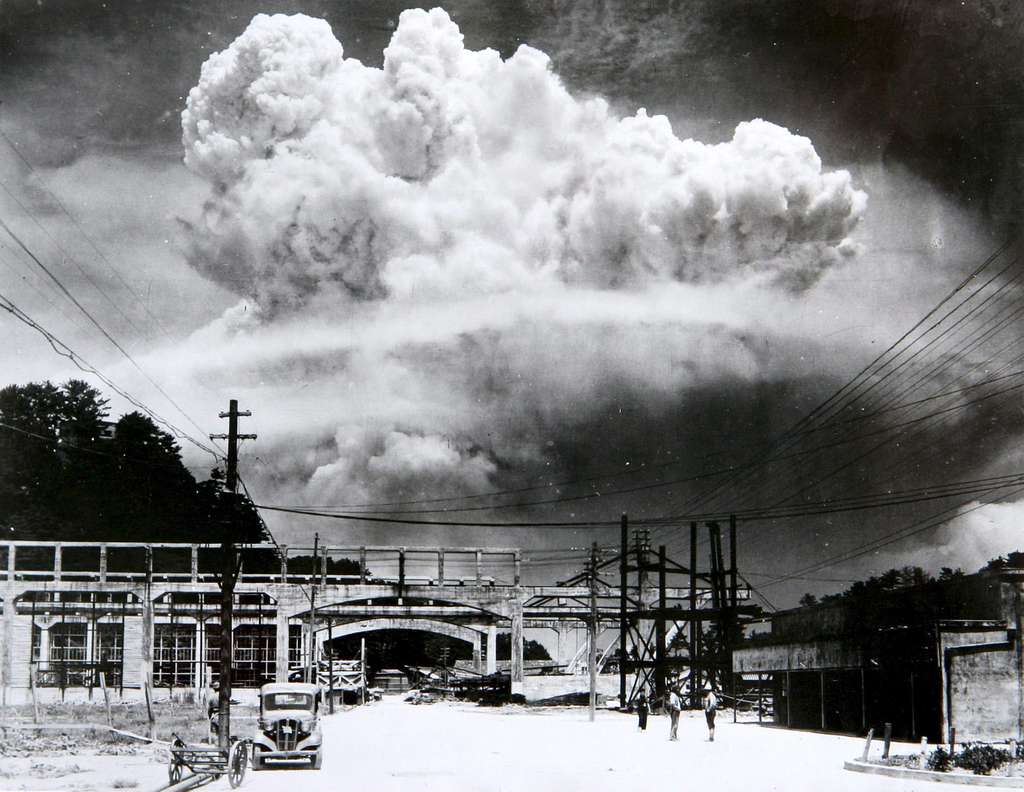
An atomic cloud hangs over the Japanese city of Nagasaki after the U.S. dropped a second nuclear bomb on the country on Aug. 9, 1945. (Hiromichi Matsuda, Wikimedia Commons, Public domain)
By Scott Ritter
Special to Consortium News
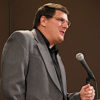 On June 18, 1945, President Harry Truman, who had taken over the presidency in April 1945 following the death of Franklin Roosevelt, convened a meeting in the White House cabinet room of his top military and diplomatic advisers to discuss the endgame strategy for defeating Japan.
On June 18, 1945, President Harry Truman, who had taken over the presidency in April 1945 following the death of Franklin Roosevelt, convened a meeting in the White House cabinet room of his top military and diplomatic advisers to discuss the endgame strategy for defeating Japan.
Nazi Germany had surrendered in early May, and Truman was now dealing with the realities which accrued from that event. Under pressure from Congress, the U.S. had demobilized more than 450,000 soldiers in Europe, sending them home even as Truman wrestled with the probability of more than 260,000 U.S. casualties should he order the invasion of the southern Japanese island of Kyushu, part of the Japanese homeland (incredibly, Congress also authorized the demobilization of 30,000 troops in the Pacific, even though the war with Japan was far from over.)
In short, America’s appetite for war was waning.
Truman also had to deal with the issue of the victorious Soviet Red Army, which had played the leading role in defeating Nazi Germany and, as a result, now occupied all eastern Europe and half of Germany, including its capital, Berlin.
Ignoring the fact that the Soviet Union and its leader, Joseph Stalin, were exhausted by a war that had destroyed a third of its industry and killed more than 27 million of its citizens and, as such, were looking for peace, not a new war with the West, Truman fell under the sway of his closest advisers, including his choice to be secretary of state, James Byrnes, who viewed the Soviets as a threat that had to be contained and, if necessary, confronted by U.S. military power in the post-war period.
How to square the need to simultaneously defeat Japan, deal with the increasing political pressure to demobilize, and present a strong military posture to the Soviet Union was one of the more pressing challenges facing Truman and the men he had gathered in the White House cabinet room.
The answer lay in the atomic bomb — J. Robert Oppenheimer’s “gadget ”— which was, at the time of the June 18 meeting, being prepared for testing in the badlands of New Mexico.
The huge responsibility that attached itself to the existence and potential use of this new weapon weighed heavily on the attendees. During this meeting, Secretary of War Henry L. Stimson reminded those present that
“our leadership in the war and in the development of this weapon [the atomic bomb] has placed a certain moral responsibility upon us which we cannot shirk without very serious responsibility for any disaster to civilization which it would further.”
When the discussion turned to the use of the atomic bomb as a “war winning” tool designed to break the spirit of the Japanese and compel them to surrender unconditionally, Assistant Secretary of War John J. McCloy proposed a compromise: why not show flexibility regarding the need for “unconditional surrender,” such as allowing the Japanese emperor to stay in place as the head of state, and, as a way of reinforcing to the Japanese the reality of America’s overwhelming superiority in arms, tell the Japanese about the existence of the atomic bomb, giving them the clear option of capitulating under reasonable terms or watching their cities be destroyed?
Truman, intrigued with the concept, had McCloy take his proposal to Byrnes to see what the future secretary of state thought about it (Byrnes was, at the time, in the process of being confirmed by the U.S. Senate).
Byrnes, concerned about the perceived threat from the Soviet Union, rejected McCloy’s proposal, opting instead to go forward with the use of the atomic bomb on Japan with the dual mission of helping bring a rapid end to the war with Japan and, perhaps more importantly, since McCloy and others believed Japan was ready to surrender, obviating the need to use the bomb, as a demonstration of U.S. military power to the Soviet Union in an effort to deter any post-war antics on their part in Europe.
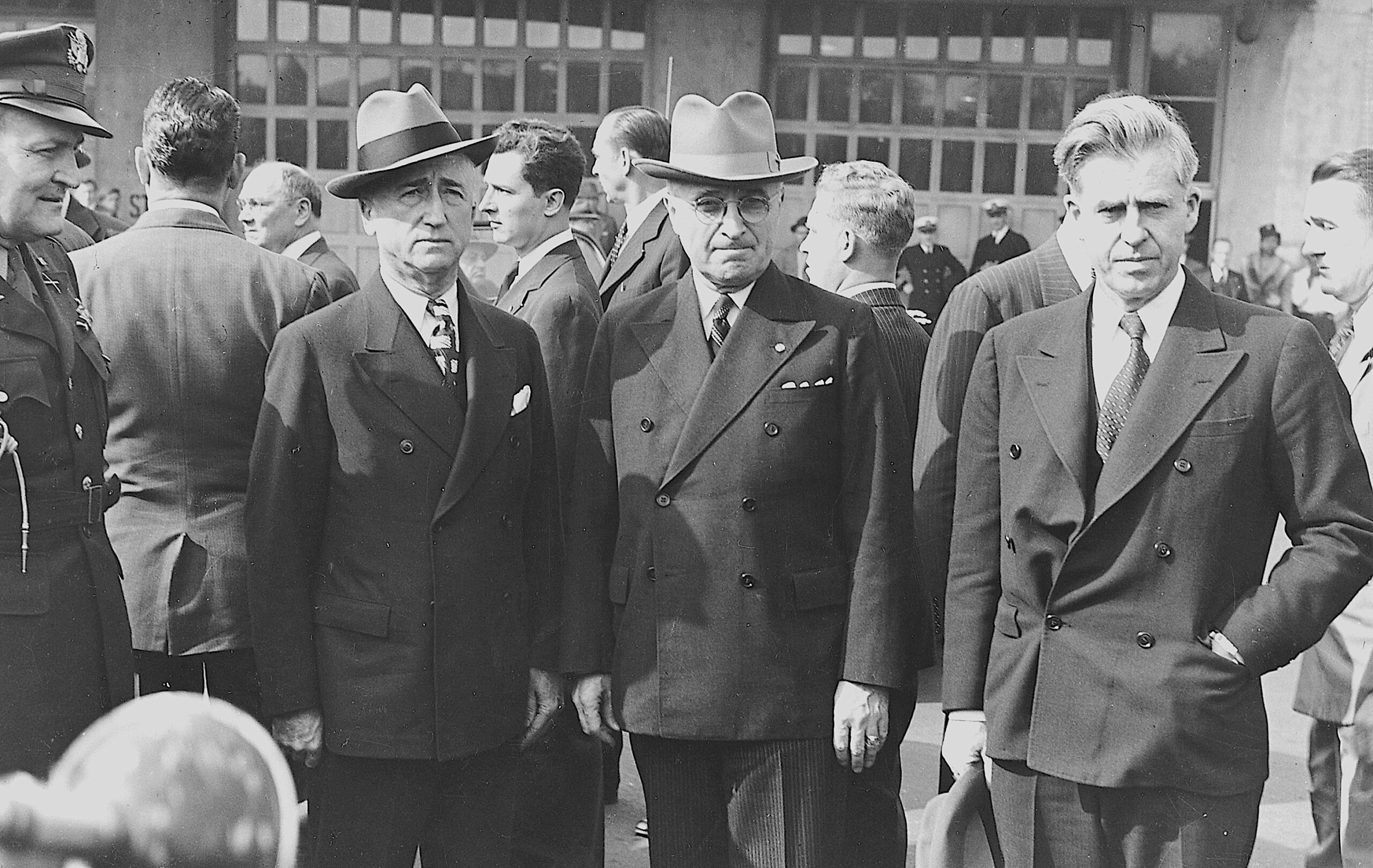
From left: James F. Byrnes, President Harry S. Truman, and Henry A. Wallace, during President Franklin D. Roosevelt’s funeral, April 14, 1945. (Abbie Rowe, U.S. National Archives, Wikimedia Commons)
Byrnes’ strategy, however, was nonsensical given what subsequently transpired. On July 17, 1945, Truman was in Potsdam, Germany, for a major post-war conference with Joseph Stalin and British Prime Minister Winston Churchill (the “Big Three”).
The day before, July 16, Oppenheimer had successfully tested a prototype of a plutonium bomb in the deserts of Alamogordo, New Mexico. (Oppenheimer and his team of nuclear scientists had also developed an atomic bomb that made use of highly enriched uranium as its core. This weapon was far simpler in its design, and as such the need to test it was not as acute.)
Truman revealed the existence of this weapon to Stalin on July 24. The Soviet leader, nonplussed, said he hoped the Americans would put it to good use against the Japanese. Stalin had committed to entering the war against Japan no later than Aug. 15.
Soviet forces, fresh from their victory over Nazi Germany, were being redeployed to the Soviet Far East, where they would be used to defeat the more than 1 million Japanese soldiers who occupied northern China and Korea.
With the promised involvement of the Red Army, the military defeat of Japan was assured. Truman, in notifying Russia of the existence of the bomb, had put the Soviets on notice about the reality of American military might.
There was, literally, no valid reason to drop an atomic bomb on a Japanese city.
Denying the Soviets in Post-War Asia
Truman, however, under the influence of Byrnes, began to worry about the Soviets gaining a dominant position in post-war Asia. Rather than cancelling his order to use America’s horrible new weapon, he allowed the attack to go through in hopes that it would cause the collapse of Japan before the Soviet Army began its offensive, thereby denying the Soviets the opportunity to expand their influence in the Pacific.
Japan’s fate was sealed.
Much has been written about the American use of an atomic bomb on the Japanese city of Hiroshima on Aug. 6, 1945. The name of the B-29 that dropped this weapon of mass destruction, the Enola Gay, and the name of the pilot who flew the aircraft, Paul Tibbets, have gone down in history.
A “Target Committee” formed in April 1945 nominated five Japanese cities as candidates for attack using the atomic bomb: Kokura (today known as Kitakyushu), Hiroshima, Yokohama, Niigata, and Kyoto. At some point someone had amended the list by writing in “Nagasaki” by hand.
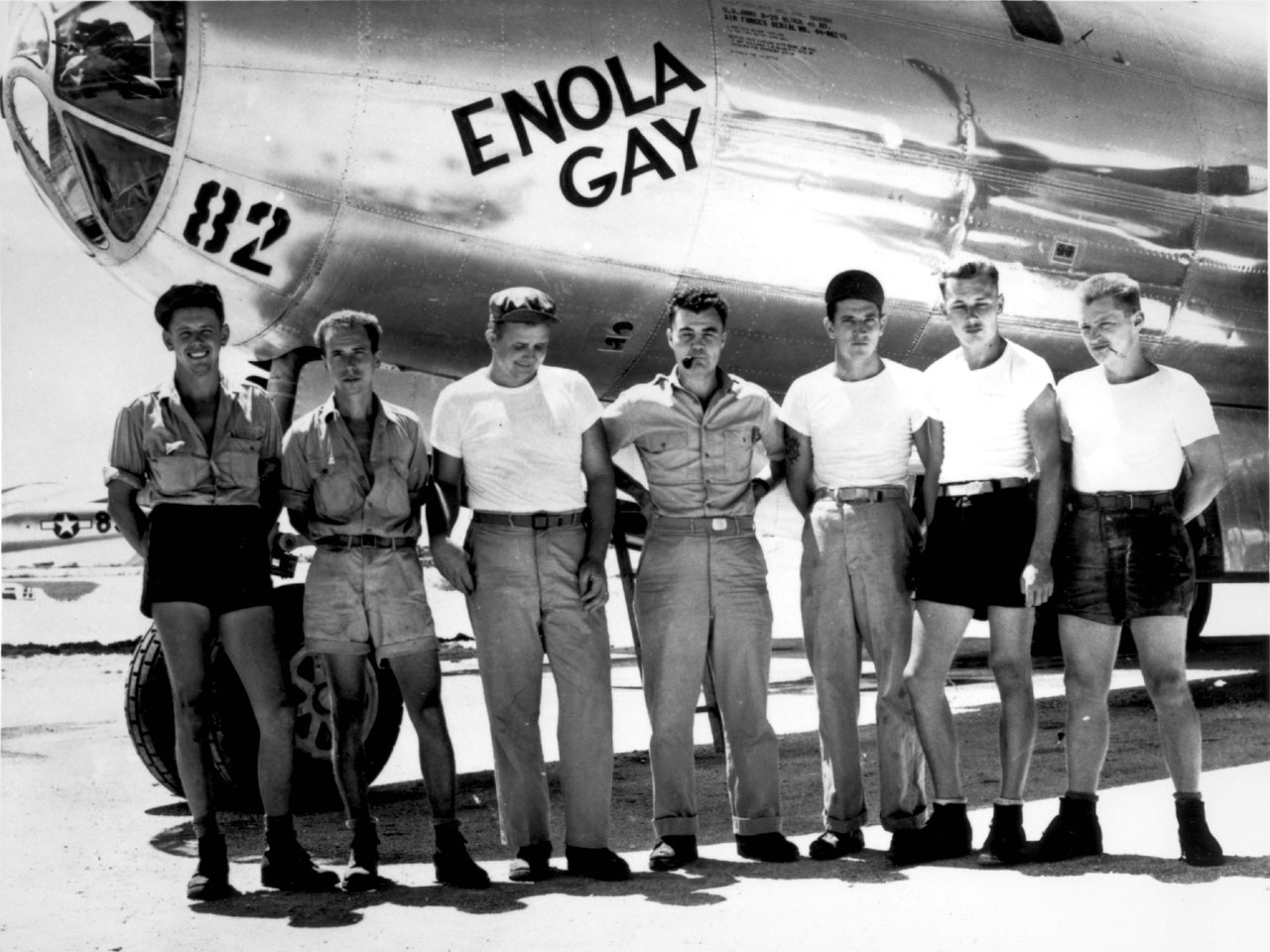
The ground crew of the B-29 “Enola Gay” which atom-bombed Hiroshima, Japan. Col. Paul W. Tibbets, the pilot is in the center. (Public domain)
The reasoning behind this last-minute change had nothing to do with military matters. Rather, it came at the request of Secretary of War Stimson who personally asked Truman to remove Kyoto from the list because Stimson had honeymooned there years ago and was taken by its beauty and culture.
The committee had considered the psychological importance of the use of the atomic bomb, both in terms of its impact on the Japanese people, but also as to make “the initial use sufficiently spectacular for the importance of the weapon to be internationally recognized when publicity on it is released.”
The Soviet Union, it seemed, had to be put on notice about the terrible reality of American nuclear supremacy (the hubris contained in this objective is underscored by the fact that, thanks to the work of Soviet intelligence, Stalin was already aware of the U.S. atomic bomb project, and, in 1942, had tasked his own scientists to begin work on building a Soviet bomb which, when tested in 1949, ended America’s short-lived nuclear supremacy.)
Hiroshima Attacked
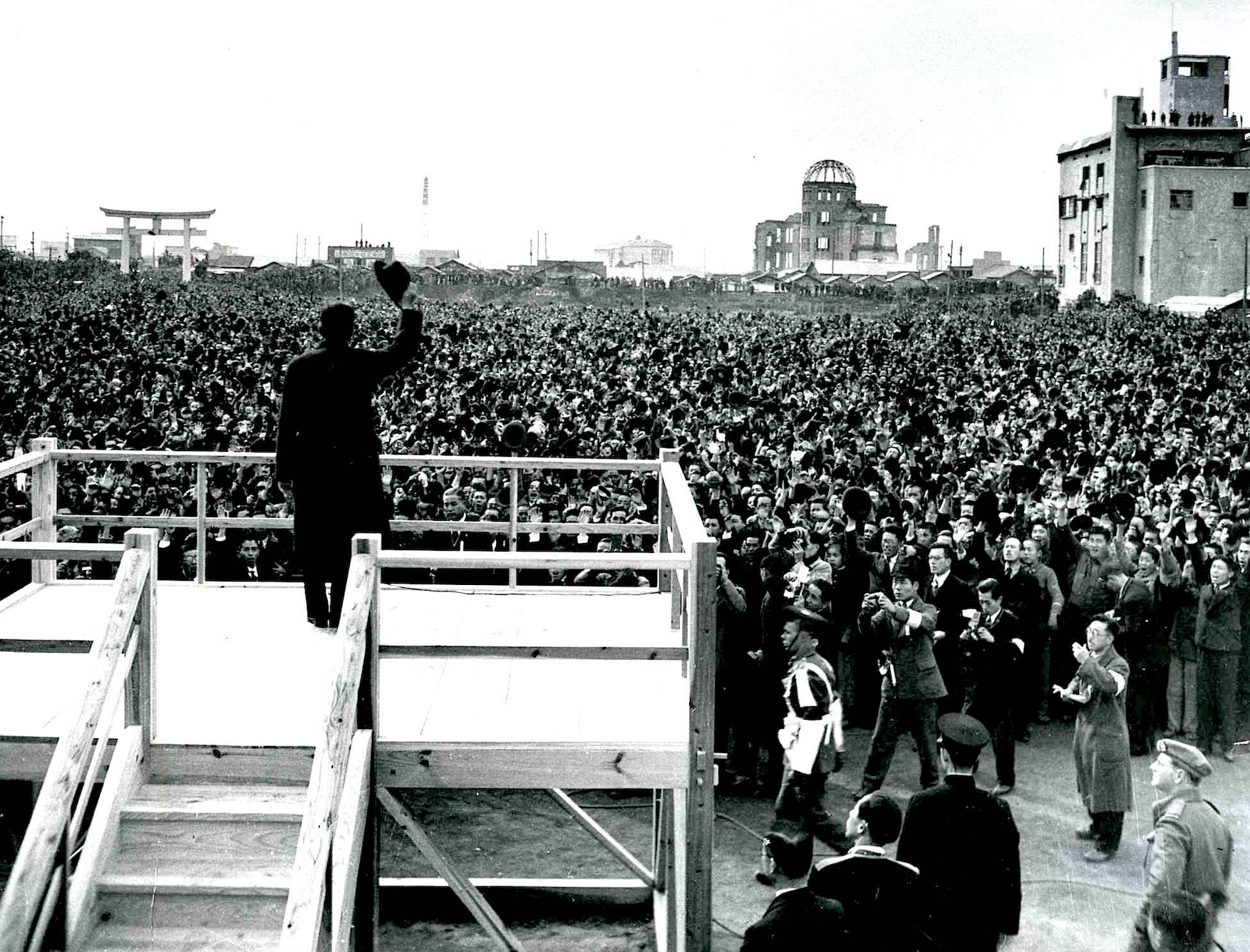
Emperor Hirohito visiting Hiroshima in 1947; the dome of what would become the Hiroshima Peace Memorial can be seen in the background. (Asahi Shimbun Company, Wikimedia Commons, Public domain)
Hiroshima was attacked and destroyed on Aug. 6, 1945. It is estimated that 66,000 Japanese were killed by the immediate effects of the weapon, and that an additional 100,000 were killed by the end of 1945 from injuries sustained during the attack.
The Hiroshima attack made use of the “Little Boy” atomic weapon — the simpler enriched uranium weapon that had not been tested previously.
The next attack on Japan using an atomic bomb was scheduled for Aug. 11. This attack would make use of the “Fat Man” plutonium weapon that had been successfully tested back on July 16.
Intelligence reports were trickling into the White House about the impact the Hiroshima attack had on the Japanese government.
While the Japanese military was reticent about recognizing the danger posed to Japan by the revelation of this new American weapon (Japan had been engaged in its own abortive atomic bomb program, and assessed that even if the U.S. had dropped such a weapon on Hiroshima, its inventory of available weapons would be very limited, and Japan should, therefore, simply ride out the storm), the Japanese emperor was of a different mind.
In talks with Foreign Minister Shigenori Togo on Aug. 8, Emperor Hirohito declared that the war must end. Togo later confirmed that it was the atomic bomb attack on Hiroshima that led the Japanese Emperor to this conclusion.
Fate, however, intervened.
On Aug. 7, one day after the Hiroshima bombing and one day before Hirohito made his decision to end the war, the American commanders involved in the implementation of the July 24 strike order which directed that Japan be attacked using the atomic bomb beginning after Aug. 3, and continuing as weapons became available, met to discuss the next attack.
When informed that the “Fat Man” device could be assembled for use by Aug. 11, Paul Tibbets — the pilot of Enola Gay — noted that the weather over Japan was predicted to be bad that day, and requested that the bomb assembly be completed by Aug. 9.
Fatal Decision for Nagasaki
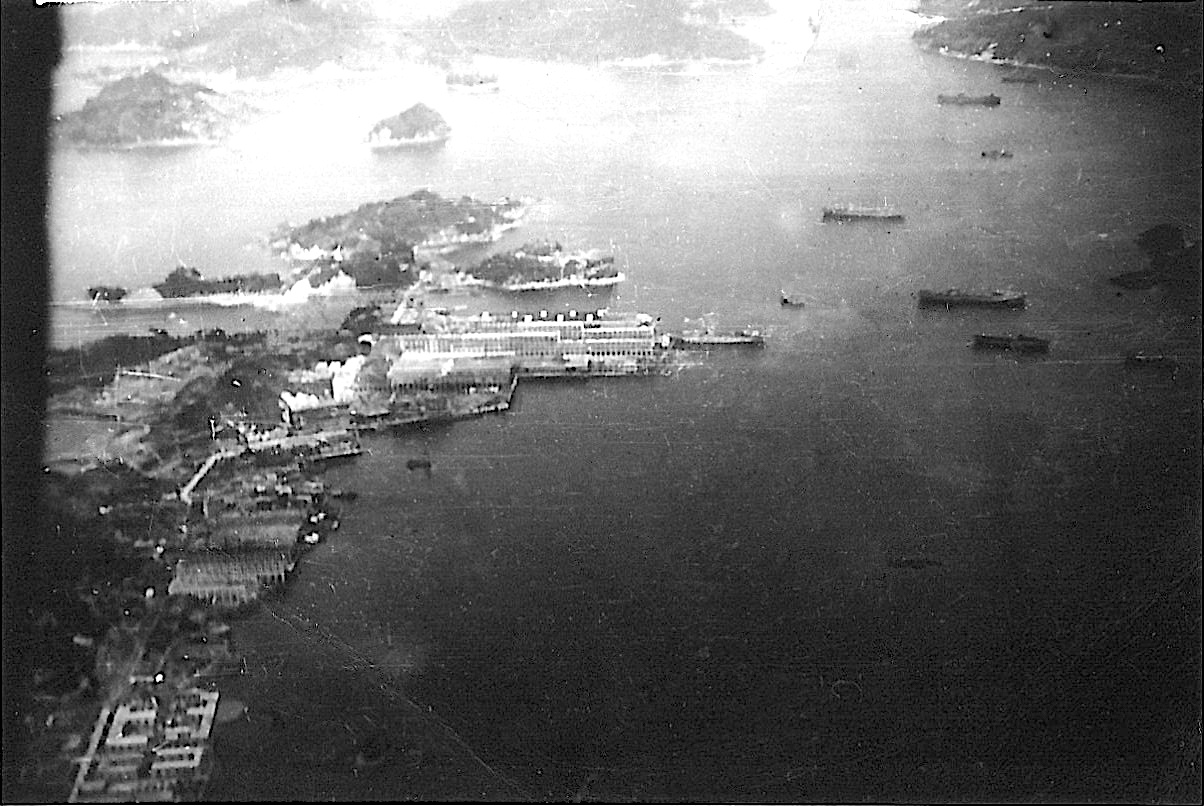
The harbor at Nagasaki in August 1945 before the city was hit with the atomic bomb. (Flight Officer Bruce C. Saxton, Wikimedia Commons, Public domain)
This decision proved to be fatal for the citizens of Nagasaki. Had the original Aug. 11 attack date been retained, it is highly likely that Hirohito would have communicated his desire to end the war in time to forestall a second attack.
There was one other factor that needs to be considered — the Aug. 9 Soviet decision to begin combat operations against Japan. This action led to the Japanese declaring martial law, which would have complicated any potential for peace.
Could Hirohito have prevailed over his generals to end the war had he been given two days to consult? We will never know, because on Aug. 9 the U.S. dispatched a B-29 nicknamed Bockscar, flown by Charles Sweeney, to drop the “Fat Man” plutonium bomb on a second Japanese city.
Nagasaki was not the intended target. That honor fell to the city of Kokura. However, a mixture of clouds, haze, and smoke made visual acquisition of the target impossible (given the desire to achieve the maximum damage of a target, the crews piloting the atomic bomb-armed B-29’s were prohibited from using radar for target acquisition, as any significant deviation from the intended aim point would reduce the level of destruction being sought by the U.S. command.)
Instead, very specific visual target recognition standards were implemented. These standards saved the citizens of Kokura.
Nagasaki was likewise almost saved by similar factors. At the last second (the B-29 had suffered a fuel pump malfunction and was running dangerously low on fuel), the bombardier observed the specific aiming point, and guided the B-29 to its target.
As a direct result of the resulting explosion, 60,000 Japanese were estimated to have been killed with another 30,000 perishing from the results of the attack by year’s end.
The Nagasaki attack took Truman by surprise — he seemed unaware that the bombing of Japan using atomic bombs was on fully automatic as long as there were bombs and targets available. Reports about the horror inflicted on Hiroshima were coming into the White House, and the horror of what he had unleashed was starting to take root.
On Aug. 10, Truman directed that there would be no more atomic bomb attacks on Japan without his express permission, saving the citizens of Kokura and Niigata from nuclear slaughter (Yokohama had been removed from the list because it had been bombed with conventional munitions in late July and the targeting team wanted only “fresh” targets so that the full effect of the destructive power of the atomic bomb could be assessed.
Had the “Fat Man” bombing been scheduled for its original date — Aug. 11 — it is possible that Truman, having become better appraised of the destructiveness of the Hiroshima weapon — would have ordered a cessation in atomic attacks prior to the attack going through.
And the murder of the citizens of Nagasaki would never have occurred.
But it did, and every year since, the citizens of Nagasaki have gathered to commemorate this dark day in their history.
It is a solemn moment, one that is not meant to be politicized.
For this reason, the mayor of Japan decided not to invite Israel to the ceremony out of concerns that anti-Israeli (and pro-Palestinian) demonstrators might disrupt the proceedings.
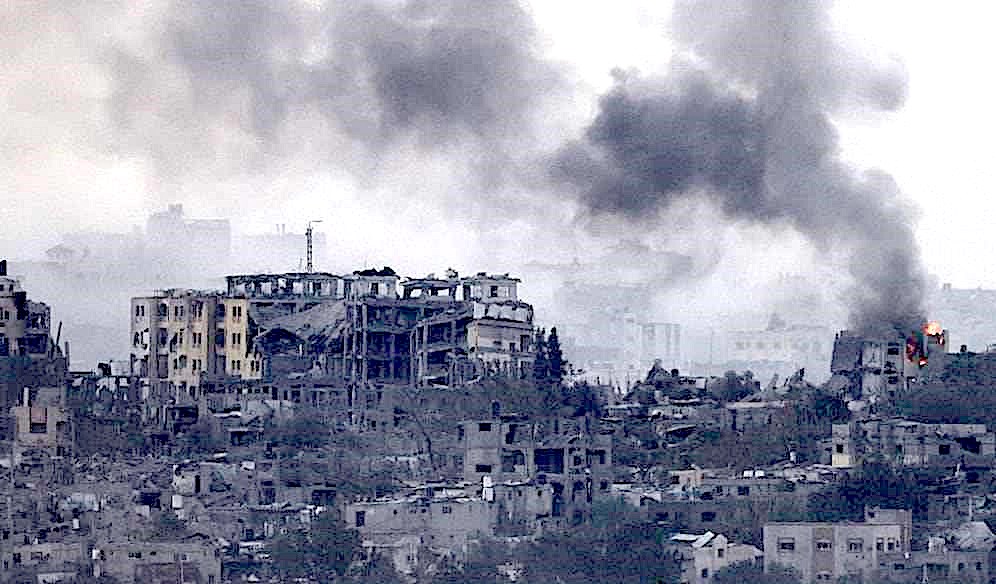
Damaged buildings in Gaza, Dec. 6, 2023. (Tasnim News Agency, Wikimedia Commons, CC BY-SA 4.0)
The U.S. ambassador to Japan, Rahm Emmanuel, informed the mayor that he would not be attending the ceremony unless Israel was invited to participate.
The very notion that the United States — the nation responsible for the atomic attack on Nagasaki — would opt out of attending the commemoration of its mass murder of Japanese because it instead opted to defend the honor of a nation, Israel, which is actively engaging in mass murder – indeed genocide against the people of Gaza – is mind boggling.
Unless you’re an American government official.
In which case, it makes perfect sense to defend one mass murder by ignoring your complicity in the murder of others.
Scott Ritter is a former U.S. Marine Corps intelligence officer who served in the former Soviet Union implementing arms control treaties, in the Persian Gulf during Operation Desert Storm and in Iraq overseeing the disarmament of WMD. His most recent book is Disarmament in the Time of Perestroika, published by Clarity Press.
The views expressed are solely those of the author and may or may not reflect those of Consortium News.

So the the USA plumbs new depths, just when you thought over 50 standing ovations for a mass murderer and main instigator of a genocide was as low as it gets.
Those two horrendous acts by the USA marked the beginning of its descent into an evil and corrupt hell of its own making. It has shown no remorse for any of its actions since then, and continues to inflict death and destruction on millions around the world.
No other country has caused so much harm in such a relatively short time, and on such a scale.
The United States has regressed to a new low in reflexive bellicosity towards it’s perceived enemies and disregard for the well-being and dignity of it’s allies. What could be a more grotesque diplomatic faux pas than U.S. refusal to attend Nagasaki’s annual commemoration of the atomic bombing due to genocidal monster Israel’s not being invited ? This boorish level of support – at all costs to itself – of the latter-day Nazi state only accelerates the United States’ diplomatic and economic isolation in a multipolar world. Historically, the decision to drop atomic bombs on Japanese cities quite possibly would not have occurred if the Democratic party had not rebelled against Franklin Roosevelt’s original choice for his Vice President in 1944, Henry Wallace. But Wallace was far too conscience-driven { once expressing a heavy heart over the slaughter of hundreds of thousands of pigs, as Secretary of Agriculture, to aid in increasing disastrously low farming prices } and social democratic-leaning to be allowed so perilously close to presidential power. Harry Truman, a product of machine politics, didn’t even know about the Manhattan Project until being hastily sworn in after Roosevelt’s abrupt passing. Whether Wallace might have balked at the prospect of using the new doomsday weapon on Japan or Truman, if time afforded it, would have halted it’s further use after the Hiroshima bombing will never be known. But a new, and entirely unnecessary, Cold War with Russia holds the world hostage. As the United States’ moronic nuclear brinkmanship with Russia and China poses the greatest danger of planetary catastrophe since the Cuban Missile Crisis. The same unhinged, paranoid delusions of Russian intentions to usurp territorial power ‘rightly’ belonging to the U.S.A., as the latter arms and finances Israeli genocide, serves to depressingly illustrate that an empire in decline presents at least as much of threat to life on earth as a nascent one.
Thank you for your work and your courage, Scott Ritter. Always very valuable information.
Seeking truth and justice often brings the courage needed,with a sense of immortality.
Now I know how to find those needed to manage the Congress Of Debate (dotcom)!
For those herein who would enjoy refreshing their recollections of Scott Ritter’s presciently objective knowledge and informed opinions on the Russia VS the USA this previous article appeared in CN on June 21, 2023.
hxxps://consortiumnews.com/2023/06/21/scott-ritter-on-horse-radishes-nuclear-war/?eType=EmailBlastContent&eId=8efb9e15-037c-4ba6-ba26-d3379ddbacb9
As Usual,
EA
Scott Ritter is a traitor to the Empire of LIES AND GENOCIDE.
Scott Ritter opposes the Empire’s agenda of LIES AND GENOCIDE.
Scott Ritter refused to be bribed by the Deep State.
What is wrong with Scott Ritter?
Hint: it could be a dangerous mental illness calked Integrity
I have the solution to Ritter’s current difficulties. It is this:
War, War, War.
Hate, Hate, Hate.
Two minutes of Hate against Putin, Xi and all Palestinians each day,
Keeps the Ministry of Truth militarised Goon Squads away.
Ritter has the absurd temerity to promote love for all humanity and he strives for Peace on Earth.
He is therefore a huge danger to all redblooded apple pie eating Americans.
Makes me so angry, I am about to burst an aneurysm.
More standing ovations for SatanYahoo, lies and genocide!
War, War, War.
Hate, Hate, Hate.
These helpful messages brought to you by Stinkin’ Blinken, Jerkoff Sullivan, Droolin’ Nuland, Smellin’ Yellen, Lloyd Raytheon, Lindsay Graycunt, John Bolturd and the old gang of warcrims who brought you Operation Iraqi Liberation (OIL) in 2003
Rahm Emanuel does not speak for me. Japan ought not invite the USA to the Memorial Nuclear Remembrance.
Rahm Emanuel is nothing but filth, and should be deported to the country he represents.
Ah yes, good old Rahmbo. Good old Rahm-per-room.
Always reliably serving elite and corporate interests. And always crassly insensitive to the needs and concerns of anybody and everybody else.
Bravo, bravo, bravissimo, Scott! We are with you 109%!!! Will send the Spanish version of this to my Panamanian neighbors. I’m an ex pat from NY and TX now living in Ciudad de Panama’.
Our presidential candidate is “anointed” not chosen out of a democratic process of the open convention. Our chosen Senators and Representatives form an entity impervious to the full demands of its voting constituents. purchased as they are by AIPAC (essentially a foreign entity with USA citizens) employed in destroying our democracy through purchasing our so- called representatives. They are not our representatives. Their fealty belongs to AIPAC and the corporate. It is time for a National Citizens Civic Union. Together a force to be seriously reckoned with. Without unionizing, democracy dies. Scattered civic power does not equal the united Big Fat Money and Corporate Power. New paradigms are being required of the citizenry to undo corporate oligarchic imperial power.
Interesting idea.
AIPAC is actually the entity which governs US foreign policy and sad to report US democracy is already dead and its ghastly corpse is used to shield the American public from the fact that the actual government is the Deep Government which itself is headed by Neocon zionists. Of course what the POTUS publicly says is important but that speech is guided and controlled by this power clique
I’ve never seen “Little Boy” referenced as “Little Man” before.
It’s been 79 years. He’s grown up. … We’ll fix it. Thanks.
The US wasn’t the only country to not attend the ceremony in Hiroshima commemorating the August 6, 1945 use of atomic bombs in Hiroshima and Nagasaki. Canada’s ambassador didn’t attend either.
didn’t know. What a shame!
Atomic Bombings Were Needless: WW II’s Top US Brass
August 9, 2023
The anniversaries of the atomic bombings of Hiroshima and Nagasaki present an opportunity to demolish a cornerstone myth of American history — that those twin acts of mass civilian slaughter were necessary to bring about Japan’s surrender, and spare a half-million U.S. soldiers who would have had otherwise died in a military conquest of the empire’s home islands.
Those who attack this mythology are often reflexively dismissed as unpatriotic, ill-informed or both. However, the most compelling witnesses against the conventional wisdom were patriots with a unique grasp on the state of affairs in August 1945 — America’s senior military leaders of World War II.
Let’s first hear what they had to say, and then examine key facts that led them to their little-publicized convictions:
• General Dwight Eisenhower on learning of the planned bombings: “I had been conscious of a feeling of depression and voiced to [Secretary of War Stimson] my grave misgivings, first on the basis of my belief that Japan was already defeated and that dropping the bomb was completely unnecessary, and secondly because I thought that our country should avoid shocking world opinion by the use of a weapon whose employment was, I thought, no longer mandatory as a measure to save American lives. It was my belief that Japan was, at that very moment, seeking some way to surrender with a minimum loss of ‘face’.”
• Admiral William Leahy, Truman’s Chief of Staff: “The use of this barbarous weapon… was of no material assistance in our war against Japan. The Japanese were already defeated and ready to surrender because of the effective sea blockade and the successful bombing with conventional weapons.”
• Major General Curtis LeMay, 21st Bomber Command: “The war would have been over in two weeks without the Russians entering and without the atomic bomb… The atomic bomb had nothing to do with the end of the war at all.”
• General Hap Arnold, US Army Air Forces: “The Japanese position was hopeless even before the first atomic bomb fell, because the Japanese had lost control of their own air.” “It always appeared to us that, atomic bomb or no atomic bomb, the Japanese were already on the verge of collapse.”
• Ralph Bard, Under Secretary of the Navy: “The Japanese were ready for peace, and they already had approached the Russians and the Swiss…In my opinion, the Japanese war was really won before we ever used the atom bomb.”
• Brigadier General Carter Clarke, military intelligence officer who prepared summaries of intercepted cables for Truman: “When we didn’t need to do it, and we knew we didn’t need to do it…we used [Hiroshima and Nagasaki] as an experiment for two atomic bombs. Many other high-level military officers concurred.”
• Fleet Admiral Chester Nimitz, Pacific Fleet commander: “The use of atomic bombs at Hiroshima and Nagasaki was of no material assistance in our war against Japan. The Japanese were already defeated and ready to surrender.”
Putting out feelers through third-party diplomatic channels, the Japanese were seeking to end the war weeks before the atomic bombings on August 6 and 9, 1945. Japan’s navy and air forces were decimated, and its homeland subjected to a sea blockade and allied bombing carried out against little resistance.
The Americans knew of Japan’s intent to surrender, having intercepted a July 12 cable from Japanese Foreign Minister Shigenori Togo, informing Japanese ambassador to Russia Naotake Sato that “we are now secretly giving consideration to the termination of the war because of the pressing situation which confronts Japan both at home and abroad.”
By Brian McGlinchey Starkrealities.substack.com
hxxps://consortiumnews.com/2023/08/09/atomic-bombings-were-needless-ww-iis-top-us-brass/
Those of us who know history know all of this. The use of atomic weapons was a massive crime. The U.S. has been a criminal entity ever since.
At any point one can easily cross over that thin line that divides Civil behaviour from Barbarismn.
We are always challeged between these choices and once we cross over to choosing barbarism the moral fabric that supports a person or a Civil Society is lost.This leads to the collapse of personal or Society’s moral fibre.This is a common theme throughout human history.
American history has had a downward trajectory ever since this fateful moment when it crossed the line.
And was a criminal entity long before.
Thank you ‘sisuforpeace’ for an excellent topical response to Scott Ritter’s chosen subject; of the 3,830 views and 11 posted comments at this writing, you have set the bar for informed quality discourses exactly where it needs to be.
As Usual,
EA
More proof, as if you needed it, that Mr Ritter is a fine journalist and not a Russian operative, according to the Harris / Biden regime ( Is Biden still in that team? Wondering )
There were more people killed in the firebombing of Japan’s cities than by the two atomic bombs dropped. Terrorizing the local population’s will to resist is a tactic that all sides used. Great Britain and the US firebombed German cities while Hitler used V1 & V2 rockets to terrorize GB.
Japan’s fierce tactics of never surrender prompted the bombing and saved countless lives on both sides if the invasion had occurred.
Total war is animalistic and savage and any decision to wage war should be very thoughtfully considered and planned.
I have never met an animal who engaged in mass murder, and I think you need to understand the difference between horrific firebombing — which is viscerally revolting — and an atomic bomb. You may get to see the difference during your lifetime, unfortunately.
And I have yet to meet anyone knowledgeable who agrees with your second paragraph, including my brother-in-law who worked on the Manhattan Project then spent the rest of his life trying to atone. You remind me of my very nasty, very ignorant “Christian” neighbor who said the same #^$(@)^$%.
I can disagree without being disagreeable.
Walter J. Boyne”s Clash of Wings, World War II in the Air, would be a good start if you would like a historian’s view of the bombing.
Japan’s kamikaze attacks & no quarter given military could shed a little light on what would have occurred if an invasion had happened. American casualties were estimated to be 1,000,000 or more.
Do you have any idea what Japan’s invading Army did to the civilian population of China and the Phillippines and how they treated POW’s?
That the U.S. had planned to use the bomb against Japan to intimidate Russia was documented earlier in the Manhattan project, causing brilliant physicist, Josef Rotblat, to quit (with great difficulty) the project. See (for free) the Canadian National Film Board’s
“The Strangest Dream.”
Amen, jl. The Zionist-dominated MICIMATT, the totalitarian present government that is trying to silence Scott, has already put paid to any delusions that the U.S. is a republic with any remaining democratic characteristics. At this stage, it is an Empire, and its imperial ambitions, as well as its imperial reality, can be challenged only at the risk of serious harm to the challenger. The fact that Scott has attracted so much attention from the Empire speaks well indeed of his courage. It is, however, very difficult for him. He merits the full support of those of us who, until now at least, have not done enough to attract the Empire’s active attention. The same is true, of course, of CN.
Hear, hear. I continue to support Scott Ritter AND CN.
Japan surrenders to the US instead of Russia.
The first mass murders of a teething imperium.
How do we stop the monsters determined to destroy life on earth? They continue to get away with mass murder over and over and we can’t find a way to make them stop?
Yet, Lois, this November we will break our legs to vote for someone we think will be running the country only to find that we are legitimizing that that we complain about.
And, the USA has still learned NOTHING as they march the world over the proverbial cliff…
It seems to be largely forgotten that the bombing campaign against Japan was halted for just a few days after the atomic attacks. It resumed when surrender negotiations were not moving quickly enough to suit the US. Final air attacks on Tokyo in 1945 were by a fleet of 60 B-29s on Aug. 8, and by 70 B-29s on Aug. 10. On Aug. 14, full-scale raids resumed with 828 B-29s escorted by 186 fighters (for a total of 1,014 aircraft) attacking Iwakuni, Osaka and Tokoyama, and at night firebombing the cities of Kumagaya and Isesaki. In the final action of the air war, two B-32s did a “photo reconnaissance run” over Tokyo on Aug 18. They limped home heavily damaged by surviving Japanese fighters piloted by seasoned air aces.
In 1853 US Admiral Perry’s initial visit to Japan included the threat of a devastating war if she did not allow US merchants to trade on the very unfavorable terms he dictated. In response the Japanese people carried off one of the greatest achievements in history, going from a closeted medieval society to a modern world power in two generations. But their home islands were still located in the Pacific Ocean that US President McKinley had proclaimed “an American lake” in 1898, so conflict with the fiercely aggressive United States was preordained.
Meanwhile over German, Dresden being one of the cities U.S. bombers blasted the shit out of beyond recognition. Another needless thing the mighty U.S. empire did. And doing such awful things continues: Shock and Awe bye the U.S. again on Iraq, and the genocidal bombings by Israel on the population of innocent Palestinians which is ongoing, not to mention the awful things the U.S. did to millions in Vietnam, Cambodia, and Laos. All of these and many, many more done by the U.S. and U.S. weapons sold in complicity with other countries that enrich U.S. corporations.
And then there is the western press, mostly U.S., U.K., France, Germany and others that refuse to publish what is really happening in either test or photographs and videos. Those people are not real journalists: the NYT, Washington Post, Wall Street Journal. The U.S. does not want its people to know the real story as our government spends billions of dollars of our tax money.
Those American government officials of which you speak already look askance at your disapproval of their foreign policy. This article, while being both true and gutsy, is tantamount to throwing gasoline on a raging inferno. Bravo Scott!
Amen to that.
A related metaphor might be that the ‘inferno’ is the fires of hell.
The first response to which should be recognizing that these flames are not friendly fire and the world is already burning. Yet the power mad MICIMATT collaborators seem prepared to back the use of atomic weaponry. To save their failing empire, they would incinerate the world.
The U.S. Dem party ought to consider what their decades old “lesser of two evils” argument really implies. Evil is evil period and the title of Chris Hedges’ 2022 book says it clearly: “The Greatest Evil Is War.” No “lesser” about it.
Yet many citizens of the western world are in denial about the truth. Like the meme of the cartoon dog sitting at a table with a coffee cup saying “this is fine” while fires are all around him and dark smoke above.
And courageous journalists who report the truth about any of this are declared anathema.